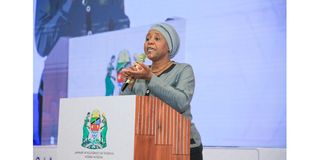Govt pushes for digital procurement to drive inclusive economic growth

Minister for Community Development, Gender, Women and Special Groups, Dr Dorothy Gwajima, speaks during the official opening of the 9th Public Procurement Forum in Arusha on Saturday, June 14, 2025. PHOTO| BERTHA ISMAIL
What you need to know:
- Finance Minister, Dr Mwigulu Nchemba, issued the directive on June 14, 2025, during the 9th Public Procurement Forum organised by the Public Procurement Regulatory Authority (PPRA) in Arusha.
Arusha. The government has urged all public procurement institutions to embrace digital systems in managing tenders, describing this as a key strategy to foster inclusive economic growth, improve transparency, and ensure maximum value for public funds.
Finance Minister, Dr Mwigulu Nchemba, issued the directive on June 14, 2025, during the 9th Public Procurement Forum organised by the Public Procurement Regulatory Authority (PPRA) in Arusha.
The event was held under the theme: “Digital Public Procurement for Sustainability: Empowering Local Enterprises and Special Groups for Inclusive Economic Growth.”
Delivering remarks on behalf of Dr Nchemba, Community Development, Gender, Women and Special Groups Minister, Dr Dorothy Gwajima said the adoption of digital platforms—particularly the National e-Procurement System of Tanzania (NeST), developed by the Ministry of Finance—has significantly enhanced procurement processes.
She said the platform has reduced costs, minimised delays, improved accountability, and expanded access to tender opportunities, especially for marginalised groups.
“We urge all procuring entities to use digital systems properly and consistently—not just to enhance efficiency, but to ensure that tenders reach the intended beneficiaries transparently and equitably,” Dr Gwajima said.
She added that digital procurement contributes to advancing the Sustainable Development Goals (SDGs) and promoting inclusive economic growth.
To this end, she announced that the government had directed all procuring entities to allocate a portion of their annual procurement budgets specifically to local businesses and designated special groups, including women, youth, and persons with disabilities.
“All procuring institutions must reserve 30 percent of their tenders for local companies and special groups as intended,” she said.
She further directed local government authorities to take responsibility for identifying and supporting these groups within their jurisdictions to enable them to access and benefit from procurement opportunities.
PPRA Director General, Mr Dennis Simba, described NeST as a game-changer in public procurement, saying it has transformed how tenders are managed nationwide.
“As of June 11, 2025, a total of 61,415 procuring entities had been registered on the NeST platform, with 131,202 active users. Of the 38,163 approved suppliers, 36,377 are local and 1,786 are foreign,” he said.
Mr Simba noted that in the 2024/25 financial year, government entities published procurement plans worth over Sh30 trillion. During the same period, 258,787 tenders were advertised, 61,174 were opened, and 140,494 contracts were awarded, amounting to Sh8.6 trillion.
He said 59,714 public institutions—including schools, health centres, wards, villages, and street governments—had also been integrated into NeST, enabling grassroots-level participation in digital procurement.
Ministry of Finance Permanent Secretary, Dr Natu Mwamba, disclosed that over 500 special needs groups had registered on NeST.
She encouraged members of these groups to actively seek out procurement opportunities via the platform as a way to achieve economic empowerment and self-reliance.
PPRA Board Chairperson, Ms Leonada Mwagike, highlighted the system’s environmental benefits, noting that the switch from paper-based to digital processes had led to measurable reductions in carbon emissions.
“A preliminary study for the 2023/24 fiscal year showed that using NeST helped cut carbon emissions by 617.85 metric tonnes—the equivalent of removing 144 diesel-powered vehicles from the road each month,” she said.
Ms Mwagike added that the forum had brought together over 1,500 stakeholders from various sectors to deliberate on 16 thematic areas to strengthen and modernise the public procurement system through digital transformation.




